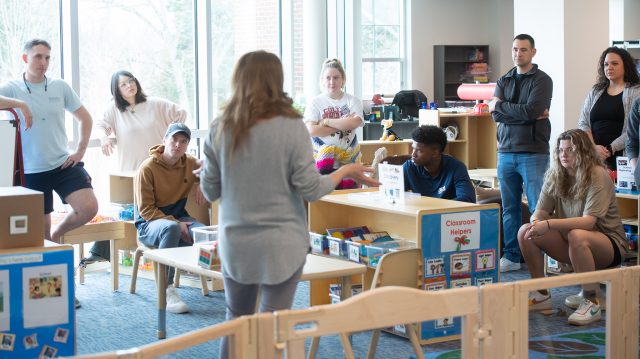
Shushan Vardanyan (center), assistant professor of early childhood education, teaches students about classroom organization and management in the North Mississippi Child Care Resource and Referral Center. The center serves as a training and support center for educators and guardians. Photo by Kevin Bain/Ole Miss Digital Imaging Services
OXFORD, Miss. – Lining the walls of the North Mississippi Child Care Resource and Referral Center are collections of books for every age and on a variety of topics, a maker’s space with paper-cutting machines and dies for making room decorations and educational crafts, rolls of paper and shelves upon shelves of toys, tools and learning materials.
The display isn’t for children, however, but for teachers, university students and Mississippi families. The Mississippi Department of Human Services awarded nearly $1 million to the University of Mississippi in partnership with North Mississippi Education Consortium for the center, which opened last June at the university’s Insight Park to serve as a training and support resource for educators and guardians.
Mississippi teachers and parents can check out these materials freely to use in their classrooms, homes, schools or in home schooling facilities. The center also provides training and support for teachers and families on topics such as classroom construction, developing fine motor skills and other early education matters.

Shushan Vardanyan (right), assistant professor of early childhood education, stands before books available for checkout in the North Mississippi Child Care Resource and Referral Center. The center has tools, tactile learning toys and learning materials available for checkout for up to four weeks and serves as a training and support center for educators and guardians. Photo by Kevin Bain/Ole Miss Digital Imaging Services
“The center provides access to incredible resources for use by parents, families, early childhood professionals and our students,” said David Rock, dean of the School of Education. “Our students can get hands-on opportunities to experience developmentally appropriate education materials for children.”
The center’s vast array of materials helps teachers, students and parents encourage learning and exploration through intentional play, said Hannah Sanders, program manager.
“The main purpose in a nutshell is to bridge the gap between early childhood professionals and families,” Sanders said. “The realm of early childhood education is very broad, and the center helps make that broad area more accessible.”
The center also sends Katie Mullins, its coach coordinator for professional development, out into the field to day cares, parent-teacher nights and school meetings to talk about the importance and appropriate application of early childhood education.
Mullins, who taught early childhood education for eight years before joining the center, said she wants parents, teachers and other educators to understand that the education children receive in their earliest years is instrumental to their success.
“We are laying the foundations for these children,” Mullins said. “A lot of people think learning through play doesn’t matter, but that is how children pick up all kinds of development that they will need throughout their life.”
After visiting multiple day care and early learning facilities across north Mississippi, Mullins said she was surprised at how few provide developmental tools and toys for the children. Many parents don’t know how to identify which learning center will teach, as opposed to simply babysit, their children, she said.

Katie Mullins, coach coordinator for professional development at the North Mississippi Child Care Resource and Referral Center, goes to day care centers, parent-teacher nights and school meetings to discuss the importance and appropriate application of early childhood education. Photo by Kevin Bain/Ole Miss Digital Imaging Services
“I don’t think people understand the importance of the groundwork we do,” she said. “They say we play all day, but we play with intention. We play for cognitive learning.
“It’s important to remember that this is a skill set really needed in our state, in our country.”
Shushan Vardanyan, assistant professor of early childhood education, has taken students from two classes to the center to teach them about classroom organization and management.
“As an instructor, I can walk through in the model classrooms and talk about the organization of the materials, furniture and the purpose of the toys, games and materials that are set for young children,” Vardanyan said.
Her classes learned simple things – such as to place the art center away from the library and close to the hand sink – and how to design a classroom that encourages experiential learning.
“The center is a great resource for the instructors to do firsthand, hands-on lectures by showing and demonstrating the students how real classroom works,” Vardanyan said.
Cathy Grace, co-director of the Graduate Center for the Study of Early Learning, emphasized the need for teachers to have access to quality materials for their classrooms, an expense that often comes from the teachers’ own wallet.
“The North Mississippi Child Care and Resource and Referral Center is a tremendous resource to teachers and parents of young children across north Mississippi,” Grace said.
“As the university builds a regional presence as a teacher education hub for individuals interested in teaching young children, this is one of the anchor programs that will serve to highlight the resources and high-level programming present.”
This material is based on work supported by the Mississippi Department of Human Services via the North Mississippi Education Consortium under Agreement Nos. 6025976, 6025977, 6025978 and Subaward No. UM-10.01.22.